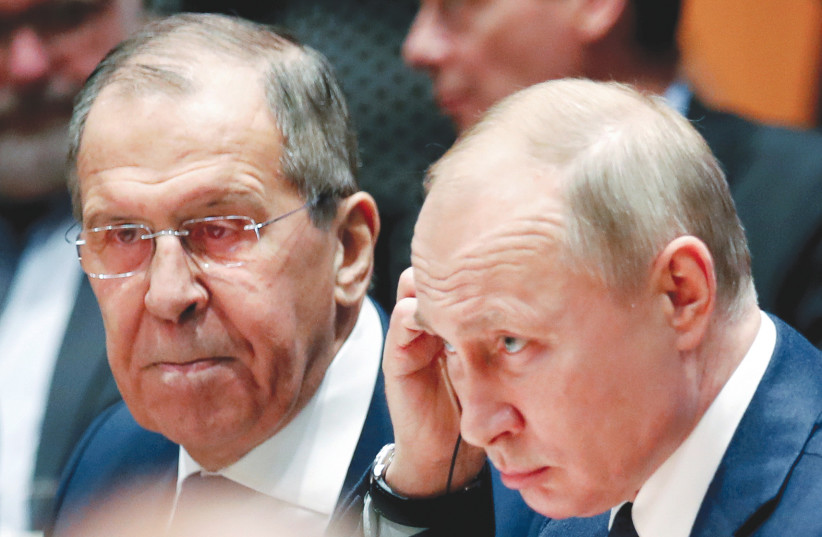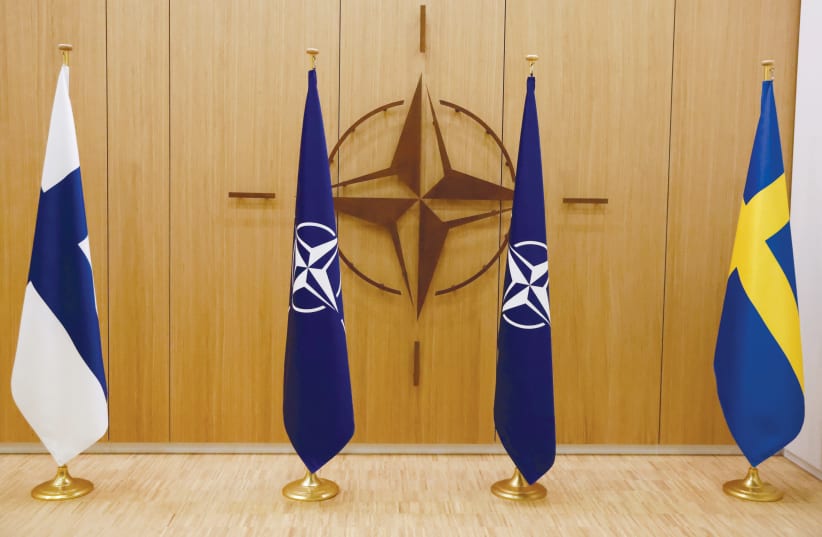The 27-year war between Athens and Sparta was in its 15th year when the Athenians, out to cement their grip of the Aegean Sea, demanded that the island of Melos – about halfway between Athens and Crete – surrender to their rule.
The Melians refused; not because they sided with one of the war’s sides, but because they sided with neither. “Neutral,” they said they are, and while that meant “being friends instead of enemies,” it also meant being “allies of neither side” (Thucydides, History of the Peloponnesian War, 5:94).
The Athenians rejected the idea, and while at it stated what still reads like imperialism’s motto: “The strong do what they can and the weak suffer what they must.”
The Melians were naïve – the Athenians leveled their capital, killed their men, enslaved their women and children and colonized their land – but the diplomatic concept they pioneered later flourished, even though this week it was dealt a severe blow.
The blow – Sweden and Finland’s abandonment of their historic neutralities – might be seen as proof that neutrality, already condemned as immoral, is also impractical. The question therefore arises: is Israel’s evolving diplomacy of neutrality, which this column backed shortly before the Ukraine war’s outbreak (“None of our business,” January 27, 2022), still valid?


It is.
NEUTRALITY’S IMMORAL version was laid bare when news broke of Swiss banks’ concealment of Holocaust victims’ cash and gold, an attitude New York Times columnist Tom Friedman called “moral fraud” (“Cynical, immoral, neutral,” May 22, 1997).
People expected better from a country that presented itself as a peace engine, one that avoided countless European conflicts including two world wars, hosted myriad peace conferences and is the headquarters of multiple international organizations.
Yet Switzerland’s model of neutrality, the idealistic, is the exception. Most neutrals, like the ancient Melians, did not purport to mend the world; they just wanted to avoid the ricochets of other people’s wars. Such were the neutralities of Sweden and Finland, which this week came to an end.
The Scandinavian pair’s neutralities, even though they evolved in entirely different times and settings, were designed to prevent collision with the Russian giant to their east. Now, with the same Russian threat compelling them to join NATO, does this mean that neutrality was misguided all along? It doesn’t.
Sweden’s neutrality, which followed the Napoleonic wars, gave it two warless centuries during which it built one of the world’s most prosperous and compassionate economies.
Finland’s neutrality is younger, having resulted from its invasion by the Soviet Union in 1939. Even so, neutrality gave it more than 70 years of quiet during which it did business with East and West while cultivating a prosperous democracy on par with its Swedish neighbor.
Was this morally perfect? It wasn’t. The man who stood at tyranny’s doorstep and shouted “Mr. Gorbachev, tear down this wall!” was neither a Swede nor a Finn. He couldn’t have been. That’s a task for what the Athenians called “the strong.”
The rest are indeed destined to “suffer what they must,” but that does not have to mean surrender. It means focusing on the narrow national interest while letting the superpowers run the world.
In fact, this thinking still guides Stockholm and Helsinki, which are joining NATO not because Russia invaded a peaceful neighbor – when Russia invaded Georgia they didn’t join NATO – but because they now fear Russia will invade them next. Israel has no such reason to retreat from its neutrality.
ISRAEL’S FIRST reason to remain neutral toward Russia is that, unlike Scandinavia, it is not in Russia’s imperial radius. It would be foolhardy for Jerusalem to shove itself into that range. The second is the concern for Russia’s sizable Jewish community. Arming Ukraine or sanctioning Russia might test Russia’s antisemitic genes, and threaten its Jews’ hard-won freedom of religion and emigration.
Yes, this is an entirely different situation than what Israel faced back when the Soviet Union armed Israel’s enemies and caged Soviet Jewry. In those years, Israel faced Russia whether it wanted to or not, so much so that at one point there was an aerial battle between Israeli and Soviet fighter jets (in July 1970, above Egypt).
Israel’s evolving neutrality is fed not only by this geopolitical context but also by Middle Eastern events.
As explained here previously, there is a broad consensus in Israel about avoiding today’s many intra-Arab conflicts. Unlike last century, when Israel got involved in civil wars from Jordan to Lebanon and Iraq, this century, Israel is shunning the civil wars in Libya, Yemen, Iraq and Syria. Israel also declared its neutrality vis-à-vis the Egyptian-Ethiopian conflict over the latter’s damming of the Upper Nile.
This was clearly the mindset with which Israel arrived at the Ukraine war, back when the general expectation was for a short and narrow conflict over disputed borderlands.
Since then the plot has taken an entirely different course.
Russia attacked the entire country of Ukraine including its capital, effectively denying Ukraine’s right to independence, and Russia targeted civilians massively and repeatedly. Russia’s emergence from all this as an arrogant Goliath with a pebble in its forehead now underscores what has transformed from a border dispute into a biblical showdown between might and right.
Now neutrality has become morally impossible to defend. Israel thus arrived at the unique compromise whereby it still avoids sanctioning Russia and arming Ukraine, but does condemn Russia’s aggression.
No, this isn’t Swiss neutrality. It’s Finnish neutrality, part of what the Athenians told the Melians that the weak must suffer while the strong do what they can. The Athenians, by the way, who assumed they were “the strong,” ultimately emerged from that war with their military crushed and their empire gone.
www.MiddleIsrael.net
The writer’s bestselling Mitzad Ha’ivelet Ha’yehudi (The Jewish March of Folly, Yediot Sefarim, 2019) is a revisionist history of the Jewish people’s leadership from antiquity to modernity.
